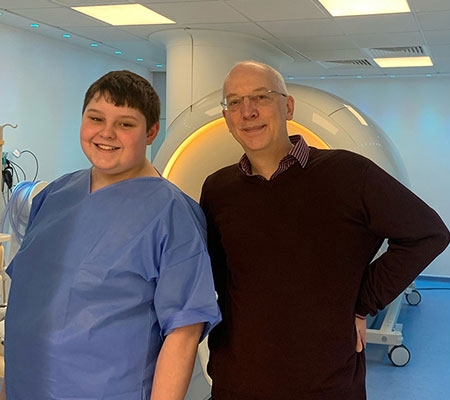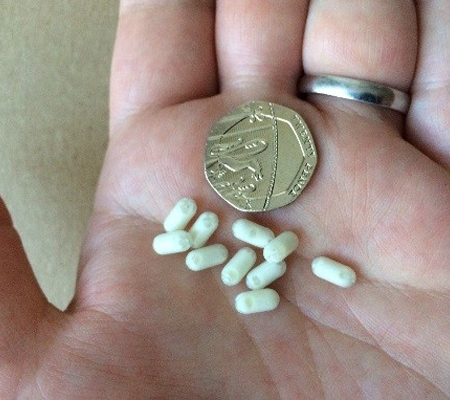A new ‘Magic’ MRI test to help manage constipation in children
Monday 20 May 2019
A group of children and young people are helping experts to test a new way of managing childhood constipation by swallowing harmless mini-capsules that show up on MRI scans to track their digestion.
One in ten children and young people suffers from constipation at some point and the problem becomes chronic in a third of them, with 27,500 per year needing hospital treatment in England alone.
Up to now there has been no completely safe and efficient way of tracking the movement of food through the gut so possible reasons for constipation have been hard to diagnose.
The ‘Magic’ (MAGnetic resonance Imaging in paediatric Constipation) programme has been designed by experts at the birthplace of MRI – the University of Nottingham. The study involves gastroenterology experts from Nottingham University Hospitals NHS Trust and the NIHR Nottingham Biomedical Research Centre and is funded by the NIHR.
MRI Capsules
The ‘Magic Bean’ mini-capsules are made of a medical-grade plastic shell and are smaller than Tic Tacs to make them easy for children and young people to swallow.They do not dissolve in the gut, and are filled with a MRI-visible liquid that stands out clearly in the scan pictures of the gut.
To test the imaging of these ‘magic beans’ the researchers initially used a crude model consisting of a string of sausages containing the capsules stuffed into a large supermarket chicken.
Leading the team is Associate Professor in Gastrointestinal MRI, Dr Luca Marciani, supported by lead clinician paediatric gastroenterologist David Devadason from the Nottingham Children’s Hospital.
Pilot Study
After a pilot study in healthy adults, a group of 25 children and young people with constipation and a further 25 without constipation were recruited from the East Midlands to take part in the trial. Three sets of 24 mini-capsules were given to each participant, to be swallowed with water or yoghurt, under supervision by a parent or guardian – one set every day for three consecutive days. On the fourth day they returned to the MRI department for a scan, which takes about 15 minutes. The scans were carried out at the world famous Sir Peter Mansfield Imaging Centre on University Park in Nottingham. Further MRI scans were carried out on day 7 if any mini-capsules could be seen on the first set at day 4.
The results of the study so far are very positive, the mini-capsules were imaged successfully in the body, the study procedures were accepted well by the participants and the safety record was excellent.
MAGIC2 Study
Now the funding has been extended with the award of a second NIHR i4i grant of £1.2 million to fund the second phase of the clinical trial MAGIC2. This will be a larger study in 436 young patients with constipation to show that using mini-capsules in standard clinical practice can improve the success of available treatments. It will also develop new and more cost-effective ways to mass-produce the mini-capsules and create software capable to that can detect the mini-capsules automatically.
The multi-centre MAGIC2 clinical trial will be managed Derby Clinical Trials Support Unit (Derby CTSU), who are provisionally registered with the UKClinical Research Collaboration UKCRC), hosted by the University Hospitals of Derby & Burton NHS Foundation Trust.
The MAGIC2 team includes also specialsts from University College London, the University of Lincoln, NIHR Children and Young People MedTech Co-operative in Sheffield, the East Midlands Academic Health Science Network (EMASHN), the Research Design Service (RDS) East Midlands (EM) and TRUSTECH in Manchester, the NIHR Clinical Research Network East Midlands and the NIHR Clinical Research Facility.





